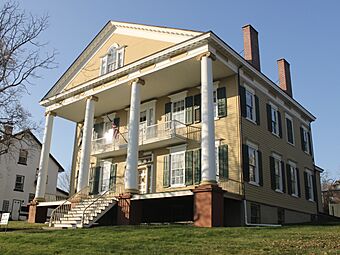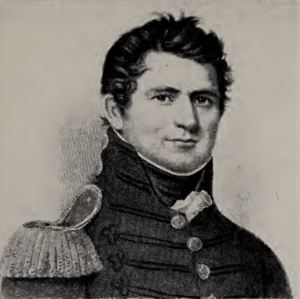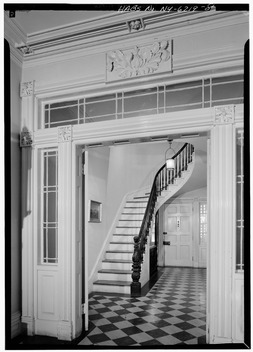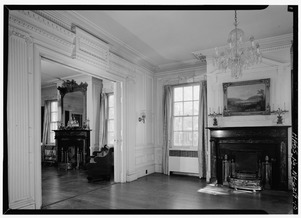David Crawford House facts for kids
|
David Crawford House
|
|
|
U.S. Historic district
Contributing property |
|

The house in 2022
|
|
| Location | 189 Montgomery St., Newburgh, NY |
|---|---|
| Built | 1830–31 |
| Architectural style | Federal |
| Part of | Montgomery-Grand-Liberty Streets Historic District (ID73001246) |
| NRHP reference No. | 72000899 |
Quick facts for kids Significant dates |
|
| Added to NRHP | September 27, 1972 |
| Designated CP | July 16, 1973 |
The David Crawford House is a special old house located at 189 Montgomery Street in Newburgh, New York. It's a historic building that now serves as a museum. It's also the main office for the Historical Society of Newburgh Bay and The Highlands. This society helps keep the history of the area alive.
Contents
Discovering the David Crawford House
This beautiful house mixes two old building styles: Greek Revival and late Federal. It was built by a man named David Crawford. He became very wealthy from shipping goods on the Hudson River in the 1820s.
David Crawford's family came from Ulster and moved to America in 1731. They settled in Little Britain. Later, in 1806, David's father, Francis, moved the family to Newburgh. He saw that Newburgh was a great place for selling farm products.
David had three brothers: Thomas, Samuel, and James. Sadly, his brothers and mother became very sick. David improved his own health by becoming a deputy sheriff in 1810. Riding horses often helped him stay strong.
David Crawford's Adventures
When the War of 1812 started, David Crawford joined the army. He put together a group of volunteers who went to New York Harbor. He joined an artillery group and was promoted to captain. While in the harbor, he learned a lot about shipping and trade. He realized how much money could be made from it.
In May 1822, David Crawford married Fanny C. Belknap. They had two daughters, Mary Elizabeth and Anna. In 1825, David helped build a steamboat. This boat would carry goods from Newburgh to New York City. The steamboat, named Baltimore, started shipping from David Crawford's dock in the spring of 1830.
The House's Unique Look
We don't know who the carpenter was who built the David Crawford House. But we do know it has some fancy details!
The door frames have detailed designs. You can see carved laurel leaves above the doors. The main staircase stands on its own and has beautiful mahogany railings. A very interesting part of the staircase is the newel post. It's carved to look like a dolphin head! People think a furniture carver from New York City or a ship figurehead maker from Massachusetts created it.
Most of the doors upstairs and on the main floor are made of pine. They are painted to look like a different type of wood.
One of the most impressive parts of the house is its large triangular roof section, called a pediment. In the middle of this pediment is a special window with three parts, called a Palladian window. Four tall, 40-foot Ionic columns support this grand feature.
Saving the House for History
On October 3, 1953, the David Crawford House was going to be sold at an auction. Many people worried that a nearby funeral home would buy it and tear it down to build a parking lot.
To save the house, the Historical Society of Newburgh Bay & The Highlands decided to buy it on September 28. Other groups, like the Ossoli Club and the Daughters of the American Revolution, also helped raise money.
People donated old furniture to fill the house, including a fancy Duncan Phyfe sofa. Senator Thomas C. Desmond gave a period door knocker. A special table with white holly designs was donated by Mary Roe Zeigler.
The house was added to the National Register of Historic Places on September 27, 1972. This means it's recognized as an important historic site. The next year, it became part of the Montgomery-Grand-Liberty Streets Historic District.
Today, the David Crawford House is the main office for the historical society. It's also a museum that opens to the public on Sundays during certain seasons and for special events. The museum has many historical items, especially boat prints and models. These items tell the story of David Crawford's shipping business. The collection also includes a Gothic style chimney that was saved from the torn-down mansion of A. J. Downing.
In 2007, the historical society received money from the state to fix the roof, chimneys, and outside of the house. The house also got a fresh coat of paint from top to bottom.
 | Misty Copeland |
 | Raven Wilkinson |
 | Debra Austin |
 | Aesha Ash |






